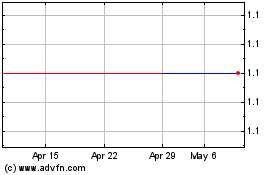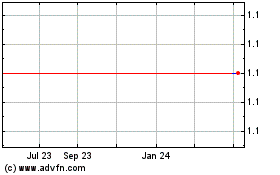EU Set to Settle Antitrust Case Against Gazprom Soon
May 07 2018 - 6:24AM
Dow Jones News
By Natalia Drozdiak and Emre Peker
BRUSSELS--The European Union is poised to settle its
long-running antitrust case against PAO Gazprom as soon as this
month, according to people familiar with the discussions, a move
that could be perceived as bending to the Russian state-owned
energy giant and at a time of rising tensions between Moscow and
the West.
A decision by the EU's antitrust watchdog would conclude one of
its most politically sensitive competition fights and would allow
Gazprom to avoid billion-dollar fines in exchange for commit ments
aimed at breaking the Moscow-based company's stronghold on the
bloc's natural-gas supply--especially in its eastern members.
The deal could have a relatively limited impact on Gazprom
because it would involve commitments to change some business
practices it has already altered in response to customer pressure.
It also contrasts with record antitrust fines in the billions of
dollars imposed on U.S. technology companies, including Alphabet
Inc.'s Google and Qualcomm Inc.
The move would come amid strained relations between Moscow and
the West over alleged Russian intervention in elections in the U.S.
and Europe, Russian policy in Syria, and over the conflict in
Ukraine. Tensions rose most recently after the U.K. accused the
Kremlin of poisoning a former Russian spy in Britain.
Margrethe Vestager, the EU's antitrust chief, has sought to
separate political developments from the Gazprom investigation
since taking office in 2014, rejecting suggestions that settling
the case without a fine would amount to appeasing Moscow.
The EU has been investigating the Russian gas-exporting monopoly
for almost seven years over its alleged unfair pricing and
restrictive terms in Central and Eastern Europe. Gazprom supplies
roughly one-third of Europe's natural-gas imports, which its
highest level since 2010.
Controversy has dogged the case. When the European Commission,
the EU's executive body, formally announced the probe in 2012,
Russian officials and Gazprom denounced it as politically motivated
and aimed at forcing the company to reduce its prices.
In 2016, when the commission unveiled a deal that would let
Gazprom avoid financial penalties and an admission of guilt, uproar
arose in some EU countries once under Moscow's control. Poland's
state-run gas firm, PGNiG SA, has advocated fines and other tough
penalties for Gazprom, which could help its European rivals in
court should they decide to sue for damages.
Ms. Vestager has defended her decision to strike a bargain with
Gazprom, saying a fine for the company's past behavior would lead
to lengthy court challenges, and wouldn't necessarily alter the
company's business practices. She has also stressed the EU could
still fine the company if it fails to meet its obligations.
Gazprom, which once demanded rigid, long-term contracts linked
to oil prices, has in recent years shifted commercial practices to
sell more gas at prices pegged to market benchmarks. The shift was
motivated by a desire to boost revenues as oil prices sank to their
lowest level in more than a decade from record highs, and by
Russia's desire to maintain gas export proceeds.
Ms. Vestager reiterated her team's efforts to separate politics
from the probe when asked last month whether recently-announced
U.S. sanctions against Russian individuals, including Gazprom
Chairman Alexei Miller, would influence the investigation.
"It is very important to us what happens also geopolitically,"
said Ms. Vestager at a conference in Washington. "But it is
something that we try to keep strictly apart from the case
specifics."
An advisory committee of antitrust experts from the EU's 28
member states discussed the case this month, people familiar with
the discussions said, meaning the pending deal has reached one of
the last stages before a decision.
The EU last year subjected Gazprom's proposed terms to a market
test, letting competitors and other market players comment on
Gazprom's proposed pledges, which include removing contractual
restrictions that prevented customers from reselling gas across
borders. Gazprom had also offered to let its clients request price
revisions more frequently and to ensure that gas prices in Central
and Eastern European countries reflect market benchmarks.
The EU and Gazprom have since been negotiating details of the
deal based on the responses to the market test.
The final terms of the settlement appear very similar to the
initial pledges, but include a few more changes around more
flexible terms on pricing and gas deliveries, people familiar with
the talks said.
Those changes could add up to a considerable financial hit for
Gazprom, said one of the people.
Write to Natalia Drozdiak at natalia.drozdiak@wsj.com and Emre
Peker at emre.peker@wsj.com
(END) Dow Jones Newswires
May 07, 2018 06:09 ET (10:09 GMT)
Copyright (c) 2018 Dow Jones & Company, Inc.
PJSC Gazprom (PK) (USOTC:OGZPY)
Historical Stock Chart
From Mar 2024 to Apr 2024

PJSC Gazprom (PK) (USOTC:OGZPY)
Historical Stock Chart
From Apr 2023 to Apr 2024
